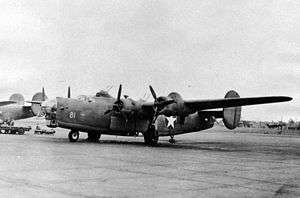Consolidated XB-41 Liberator
| XB-41 Liberator | |
|---|---|
 | |
| Role | Escort bomber |
| Manufacturer | Consolidated Aircraft |
| Introduction | 1942 |
| Retired | 1943 |
| Primary user | United States Army Air Forces |
| Number built | 1 |
| Developed from | Consolidated B-24 Liberator |
The Consolidated XB-41 Liberator was a single Consolidated B-24D Liberator bomber, serial 41-11822, which was modified for the long-range escort role for U.S. Eighth Air Force bombing missions over Europe during World War II.
Design and development
The XB-41 Liberator was outfitted with 14 .50 caliber defensive machine guns. These included twin dorsal turrets, a remotely operated Bendix turret (of the same type as the YB-40 used) under the chin, the usual twin Browning M2 .50 cal tail turret and twin-.50 cal fully retractable Sperry ventral ball turret, plus a twinned-mount pair (similar to the twinned tail-guns of a B-17E or -F Flying Fortress) of Browning .50 cal M2s at each waist window.[1] The port waist mount was originally covered by a Plexiglas bubble; testing showed this caused severe optical distortion and it was removed.[1]
The XB-41 carried 12,420 rounds of ammunition, 4,000 rounds of which were stored in the bomb bay as a reserve.[1] It was powered by four 1,250 hp (930 kW) Pratt & Whitney R-1830-43 radial engines.
Operational history
On 29 January 1943, the sole XB-41 was delivered to Eglin Field, Florida. Tests were carried out for two months at Eglin during the early winter of 1943.[2] These indicated significant problems with the aircraft; on 21 March 1943, the Army declared the XB-41 as unsuitable for operational use;[1] the conversion of thirteen Liberators to YB-41 service test aircraft was cancelled. Despite this, Consolidated continued to work on the XB-41 prototype; wide-blade propellers were fitted, and some of the armor was removed to reduce the aircraft's weight. Tests resumed at Eglin on 28 July 1943; however, the basic flaws of the "gunship" concept remained, and the XB-41 program was abandoned. The prototype XB-41 was redesignated TB-24D; it served as an instructional airframe for training mechanics on the B-24.[1] It was scrapped at Maxwell Field, Alabama on 2 February 1945.
Specifications (XB-41)
General characteristics
- Crew: nine
- Length: 66 ft 4 in (20.22 m)
- Wingspan: 110 ft 0 in (33.54 m)
- Height: 17 ft 11 in (5.46 m)
- Max. takeoff weight: 63,000 lb (28,576 kg)
- Powerplant: 4 × Pratt & Whitney R-1830-43 radial engines, 1,250 hp (934 kW) each
Performance
- Maximum speed: 289 mph (465 km/h)
- Range: 3,100 mi (4,989 km)
- Service ceiling: 28,500 ft (8,689 m)
Armament
- Guns: 14× .50 in (12.7 mm) Browning M2 machine guns
See also
- Related development
- Related lists
References
- Notes
| Wikimedia Commons has media related to Consolidated XB-41 Liberator. |
- Bibliography
- Andrade, John M. U.S. Military Aircraft Designations and Serials since 1909. Earl Shilton, Leicester: Midland Counties Publications, 1979. ISBN 0-904597-22-9.
- Birdsall, Steve. Log Of The Liberators. Garden City, New York: Doubleday and Company, 1973. ISBN 0-385-03870-4.
- Davis, Larry. B-24 Liberator in action. Aircraft in Action No. 80. Carrollton, Texas: Squadron/Signal Publications, 1987. ISBN 0-89747-190-3.